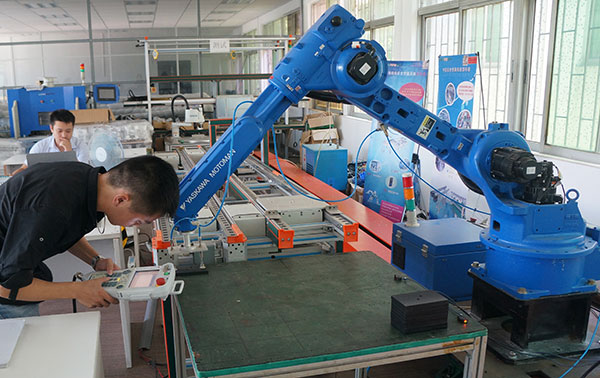Robotics experts needed in shifting economy
Updated: 2016-08-10 07:26
By Chai Hua(CHina Daily)
|
||||||||
 |
|
A worker learns how to control a robotic arm in Shenzhen, Guangdong province, in July, in response to a rising local demand for robotics engineers. CHAI HUA/CHINA DAILY |
Month after month, the national economic reports show basically the same growth rate. Nothing seems to have changed.
On the shop floor level, however, thousands of individuals are turning over a new leaf in their careers, evidence of a country in transition.
In Shenzhen, Guangdong province, a manufacturing powerhouse for the past 30 years, many old jobs are being phased out, and many new ones are up for grabs.
Wang Zaolin is an example. The 27-year-old former unit head of Foxconn, a Taiwan-based multinational company that outsources manufacturing for Apple, quit his job recently to study to become a robotics engineer.
A few months ago, Wang's unit trimmed its workforce by half.
"I used to be assigned to supervise up to 40 workers. Now it's only 20," he said. The workers had been replaced by robots.
As a graduate of a vocational school, Wang had been paid around 4,000 yuan ($600) a month. But he expects his wage to at least double after he masters programing, troubleshooting and maintaining artificial intelligence-driven machines that are a growing phenomenon in his city.
Many Shenzhen workers envy Wang's opportunity. Similar training facilities are few in the city.
Wang's school is called Linkway Intelligence Education (Shenzhen) and specializes in training former assembly-line workers. Wang is learning Programmable Logic Control, a basic skill for designing and controlling robots and a required course for becoming a robotics engineer.
Lian Guofu, director of the school, said the course in industrial robotics programming and applications is among the most popular lately. Opening in March, the school has trained 63 students and expects to quadruple that number in one year.
But training schools like Linkway are unlikely to keep up with demand. A number of factories don't bother to invest in education and some vocational schools have yet to be equipped.
In Dongguan, a smaller manufacturing city near Shenzhen, a school set up by Chitone Human Resource Chain is also finding robotics-related courses to be popular, according to Huang Tingsheng, the school's vice-director.
Across the Pearl River Delta area, many companies want to use robots on their assembly lines. Data provided by the International Federation of Robotics show that robots are also agents for creating new jobs.
Companies need robotics-trained talent just as much as they need robots, said Shang Zhenhua, director of the engineering center for Linkway Technology Development, parent of Linkway Intelligence Education.
In his company, at least 400 workers have been replaced by 200 robots in the last couple of years.
- Nepal's newly elected PM takes oath
- Texas gun law worries incoming students
- China vows to deepen economic, trade cooperation with ASEAN
- Fire guts Emirates jet after hard landing; 1 firefighter dies
- Egypt's Nobel-laureate scientist dies of illness in US
- THAAD muscle flexing unmasks anxiety over declining hegemony
 Phelps writes new page with four wins in same event
Phelps writes new page with four wins in same event
 Ma Long wins Chinese derby to edge defending champion
Ma Long wins Chinese derby to edge defending champion
 Yingjing County's hand-crafted 'black pottery'
Yingjing County's hand-crafted 'black pottery'
 Ten photos from around China: Aug 5 – 11
Ten photos from around China: Aug 5 – 11
 Inheritor of Songshan wood carving in C China
Inheritor of Songshan wood carving in C China
 "Born in China": Wild and fun
"Born in China": Wild and fun
 Top 10 foreign destinations for Chinese tourists
Top 10 foreign destinations for Chinese tourists
 Ding Ning wins table tennis gold in Rio
Ding Ning wins table tennis gold in Rio
Most Viewed
Editor's Picks

|

|

|

|

|

|
Today's Top News
Phelps puts spotlight on cupping
US launches airstrikes against IS targets in Libya's Sirte
Ministry slams US-Korean THAAD deployment
Two police officers shot at protest in Dallas
Abe's blame game reveals his policies failing to get results
Ending wildlife trafficking must be policy priority in Asia
Effects of supply-side reform take time to be seen
Chinese State Councilor Yang Jiechi to meet Kerry
US Weekly

|

|







